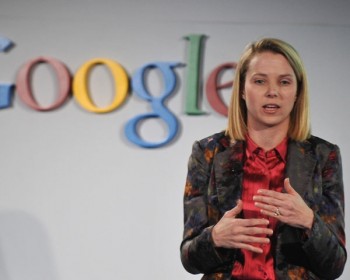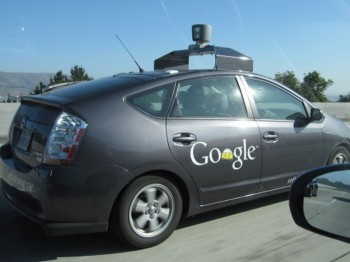After Twenty years, Google won’t just provide you with what you are searching for but it could know what you desire before you know it yourself. That’s according to Marissa Mayer, Google’s 20th hire and the company’s vice president of maps and location services.
She further said that over the next twenty years, Google will try to rectify its capability to “predict and suggest” answers for its users, perhaps even before they have asked a question from the search engine.

“I think that there’s a world that we can move into where can we do a different kind of search that’s more futuristically oriented for a person,” Mayer said during an event at the 92nd Street Y in New York City, where Bloomberg Businessweek’s editor Josh Tyrangiel interviewed the Google executive. “Can we predict what restaurants you’ll like when you’re in a new city? It may not be that you search for pizza, but we know you tend to like pizza places, or you tend to like more casual, loungey bars, so we can suggest things.”
Mayer noted that Google could finally assist people to connect to the strangers(having common interests) they don’t know.
“On the social front, can we suggest someone that we think that you should know because you have so much in common that we think you’d like each other?” Mayer said. “Can we take search and start to move it into other domains because the same core competencies apply in terms of helping people find places that they’ll like, more than those they would otherwise have found through a rote ‘I asked you for this, give me that’?”
Google’s experiments with self-driving cars could predict what kind of search it will offer in next two decades.

“A lot of people ask us what driver-less cars have to do with Google, and the truth is, when you’re driving a car, you are getting 400 different inputs,” Mayer said. “Figuring out the right input and integrating that into the appropriate driving behavior is just a search problem and just a way of integrating an answer.You will see us moving into things like that,” Mayer added cryptically.”
Former Google CEO Eric Schmidt earlier hinted about Google’s plans to develop products that could predict users’ requirements based on their past searches.
“I actually think most people don’t want Google to answer their questions. They want Google to tell them what they should be doing next,” Schmidt said in an interview with the Wall Street Journal that sparked criticism from privacy advocates.
Asked whether Google carries out a “spooky sniff test” on its services and products to evaluate whether they are creepy or beneficial, Marissa Mayer replied that Google attempts to evaluate whether the benefits of a feature accurately offsets the privacy that users must give up in order to take full benefit of the tool.
“All along the way Googlers have been really good at calling each other out, not necessarily on the spooky factor, but asking, ‘Does this make sense? Given the amount of privacy or information a user has to give us in order for us to provide this service, is the service beneficial enough?'” Mayer said.

Mayer concisely reflected on the methods Google has changed since Google’s co-founder Larry Page replaced Eric Schmidt as CEO in 2011, noting that Page’s focus on streamlining Google’s products has made the their thousands of employees focused on how — and if — a tool sufficiently fulfills users’ requirements.
“Larry is very focused on product and on users, and I think that you can feel that,” Mayer said. “Having a CEO in a more product-oriented role ultimately makes everyone think about what they’re building and whether it is beautiful, it’s excellent, and it’s a seamless user experience.”

“Can we predict what restaurants you’ll like when you’re in a new city? It may not be that you search for pizza, but we know you tend to like pizza places, or you tend to like more casual, loungey bars, so we can suggest things.”
Thanks Google for helping me stay the same forever. Just what I needed a search engine for.
“I actually think most people don’t want Google to answer their questions. They want Google to tell them what they should be doing next,” Schmidt said
And you would be totally wrong to think that. Searching for things doesn’t work nearly well enough for Google to move on to useless suggestions that extrapolate my current behavior in a completely uncreative way.
They are simply on the wrong track.
Thanks Google for helping me stay the same forever. Just what I needed a search engine for.
So you’d rather be pushed in the direction of becoming the “average consumer”?
I certainly do not want a few days of searching to be extrapolated into a complex determination of my future desires.
I obviously have no idea what sort of algorithm they use, and I can only assume it will be very intelligent, but if search suggestions of today are any indicator of the future, I foresee issues with people who may use Google so seldom such that it is unable to develop an accurate prediction and serves only to frustrate the end user.
They are on the most logical track given their assets, i.e. access to the real-time behavior of BILLIONS of human beings, something no entity has had access to in the history of the human race. Maybe you find their recommendation systems currently poor (personally I never leave the first page) but their potential to add value is ENORMOUS. They just need to forget facebook and go back to being google. If google is not mankind’s first omniscient benevolent AI accessible through a simple http query within 20 years then google will have failed.
And yet this is a natural progression for Google. I’m really interested to see how/when the public begins to resent the algorithms that control their lives. Perhaps privacy will be a feature then.
Searching isn’t perfected today, so no one at Google should have or articulate a vision for 20 years in the future?
That attitude must make one a real buzz kill around 13 year olds. “You haven’t mastered your classes for this semester yet, how dare you spend any time dreaming about what you might be when you grow up.”
Thanks for encouraging Google to stay the same forever.
“I actually think most people don’t want Google to answer their questions. They want Google to tell them what they should be doing next,” Schmidt said in an interview with the Wall Street Journal that sparked criticism from privacy advocates.”
At least they’re (sort of) upfront about it. That is advertising’s exact task, to tell you what to do. What thing to buy. What destination to buy. What service to buy. And that does seem to be what people want, because most of us sit on the couch every night watching a box tell us what to do and what to buy.
Think of all the things Google might be telling you to do. Virtually all of them will involve cash changing hands. Google will never tell you to go for a walk or play with your kid.
This is why I do not particularly like last.fm.
I play a couple of metalcore band’s and soon enough the only recommendations I get are 2 a penny metalcore bands. Yes, these bands are similar to what I want to listen to but how about some variance?
What Mayer is talking about sounds dangerous. I have a habit of looking for pizza places so this is what Google would prioritise.. I do not want this. It seems like it will skew search results.
I want Google to answer my questions and help guide me into asking the right questions to get the answers I am looking for. Beyond that.. i’m good.. I don’t need anything else.
Sometimes I feel Google forgets its search is just that… search. An application to find things. It doesn’t need to be anything more.
The main problem I see with this is how unimaginative it really is. The things they talk about Google can basically do right now.
20 years is like 200 years in internet-time.
Computers gets faster and cheaper. Eventually everyone affords their own Search-Engine. Flavored to their own personal needs, with 100% privacy, and with higher search-quality.
Spoiler alert! Google Search dies.
When software tries to be smart, it always fails. If software tries to be a leverage-tool for the users smartness, it works.
Google is on the wrong track.
Google is not giving you bad results to punish you for blocking ads.
The reason why Google is trying to learn more about you is to solve the exact problem you mention above. The Internet is getting bigger and bigger ever year, and the average cross section of the Internet is becoming less relevant to specific users. That’s why signals like your search history or your friends’ Google+ posts are useful; they can narrow down the infinite torrent of results to something that’s useful to you specifically. This may be a little creepy but there’s not much else you can do other than to build an index of the Internet yourself and tweak the ranking algorithm to suit your preferences.
Google gets a lot of press for collecting your personal information, but every site on the Internet does it. Go through your browsing history and figure out how to ask the sites you visited to delete your IP address, cookie hash, and user agent from their access.log. Pretty difficult.
(I’m not completely understanding why it’s Google specifically that you care about making sure doesn’t have your personal information. Is the imagined scenario that someday the government is going to officially hate people that meet profile X, raid Google’s servers to get user profiles, mine the data to find people that meet profile X, and then hunt them down and lock them in a concentration camp? If you meet profile X and the government wants to lock you up for it, won’t they eventually get you without Google’s data?)
Usually I do not learn article on blogs, but I would like to say that
this write-up very compelled me to check out and do so!
Your writing taste has been surprised me.
Thank you, very great article.
Have you ever thought about including a little bit more than just your articles?
I mean, what you say is fundamental and all. However just imagine if you added some great visuals or
video clips to give your posts more, “pop”! Your content is excellent but with images and video clips, this website could definitely
be one of the best in its field. Terrific blog!
Hmm it looks like your blog ate myy first comment (it was extremely
long) so I guess I’ll just sum it up what I had written and say, I’m thoroughly enjoying your
blog. I as well am an aspiring blog blogger but I’m still nnew tto tthe whole thing.
Do you have any tikps and hints forr inexperienced blog writers?
I’d certainly appreciate it.